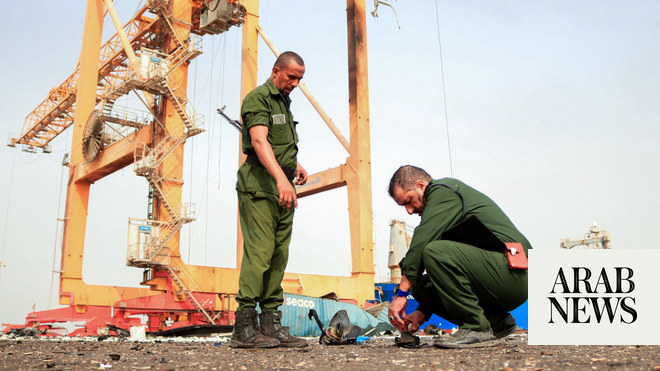ATHENS/Qamishli, Syria: Since 2022, senior Syrian and Turkish officials have met periodically in Moscow for talks brokered by Russia, but these meetings have failed to normalize the frozen relations between the two countries.
However, it is a different story now, with Turkish President Recep Tayyip Erdogan declaring his desire to restore formal relations with Syrian President Bashar al-Assad.
Earlier this month he said he could invite Assad to Turkey “at any time,” to which the Syrian leader replied that any meeting would depend on “content.”
Ankara and Damascus severed diplomatic ties in 2011 after the Syrian civil war erupted, and relations have remained hostile ever since, particularly as Turkey continues to support armed groups opposed to the Assad regime.

Since the civil war broke out in 2011, Turkiye has supported armed groups in Syria fighting President Bashar al-Assad's regime. (AFP)
So what motivated the change of approach now, and what are the likely outcomes of a normalization of relations between Turkey and Syria?
Syrian author and political researcher Shoresh Darwish believes President Erdogan is trying to normalize relations for two reasons. “The first reason is to prepare for the arrival of a new US administration led by Donald Trump, which means a possible return to the policy of withdrawing (US) troops from Syria,” he told Arab News.
“So Erdogan will have to cooperate with Assad and Russia.”
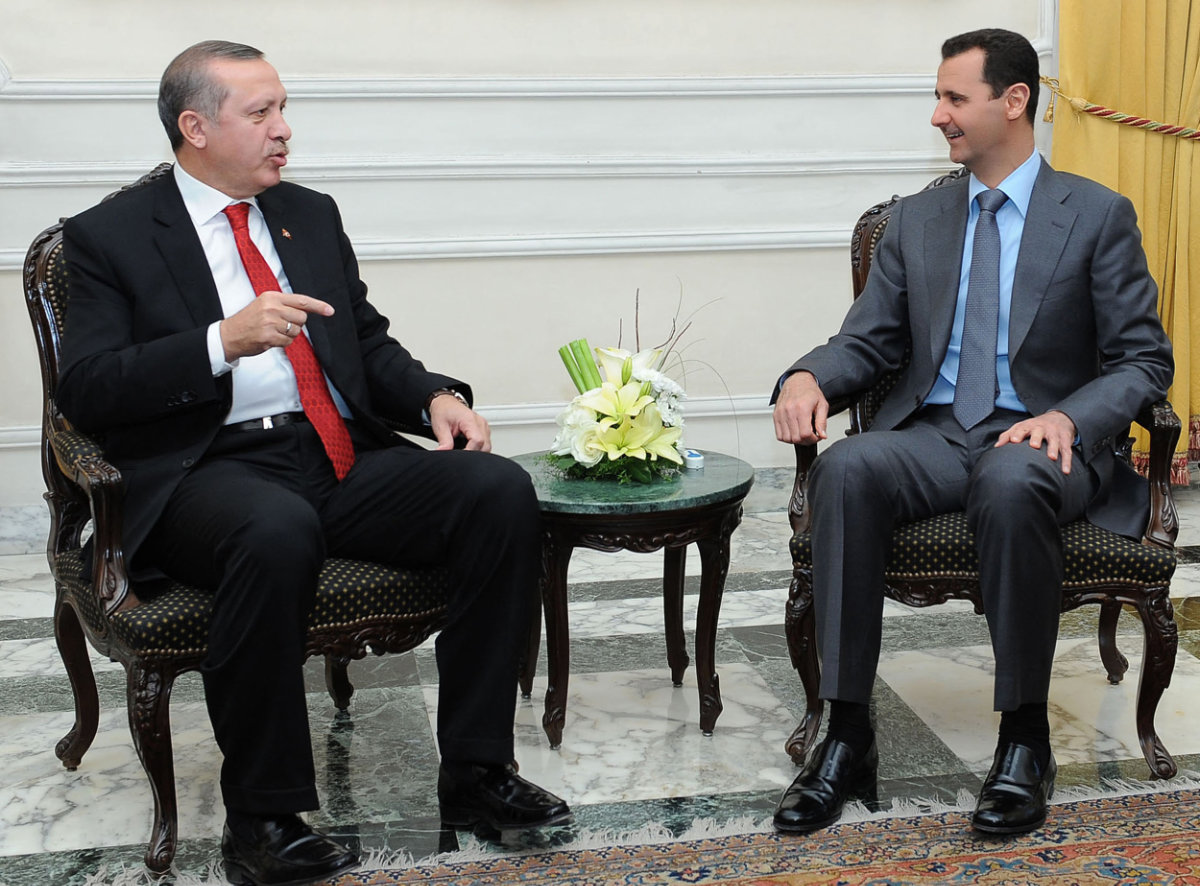
This picture released by the Syrian Arab News Agency shows President Bashar al-Assad (R) meeting with then Turkish Prime Minister Recep Tayyip Erdogan in Aleppo. (SANA/AFP)
The second reason, Darwish said, is that Erdogan wants to be closer to Russia, an ally of the Syrian regime, after Turkey turned to the United States after the war in Ukraine erupted. As a NATO member, the conflict complicates Turkey's usual approach to balancing Washington and Moscow.
“Cooperation between Ankara and Moscow is difficult on the Ukraine issue,” Darwish said. “Because of the significant Western intervention in this issue, their cooperation in Syria is a point of intersection where Erdogan wants to emphasize his friendship with Putin and Moscow’s interests in the Middle East.”
Those in the opposition-held northwestern region of Syria, backed by Turkey, see the reconciliation between Ankara and Damascus as a betrayal.

Protesters in the opposition-held city of Idlib and the Aleppo countryside waved Syrian revolutionary flags and carried signs that read: “If you want to be closer to Assad, congratulations. The curse of history is upon you.” (Photo by Ali Ali)
During one protest in Idlib since early July, protesters held signs in Arabic that read: “If you want to be closer to Assad, congratulations. The curse of history is upon you.”
“Western Syria, Idlib, the Aleppo countryside and all areas belonging to the opposition groups completely reject this behavior because it is only for the benefit of the Syrian regime,” Abdulkarim Omar, a political activist from Idlib, told Arab News.
“Syrians are demanding freedom, dignity and the creation of a democratic and civil state for all Syrians, which can only be achieved by overthrowing the Syrian dictatorship led by Bashar al-Assad. They remain committed to these principles and slogans and cannot abandon them.”
People living in areas controlled by the Kurdish-led, US-backed Autonomous North and East Syrian Government (AANES), which holds most of Syria east of the Euphrates River, are also wary of the implications of a return to normalcy.
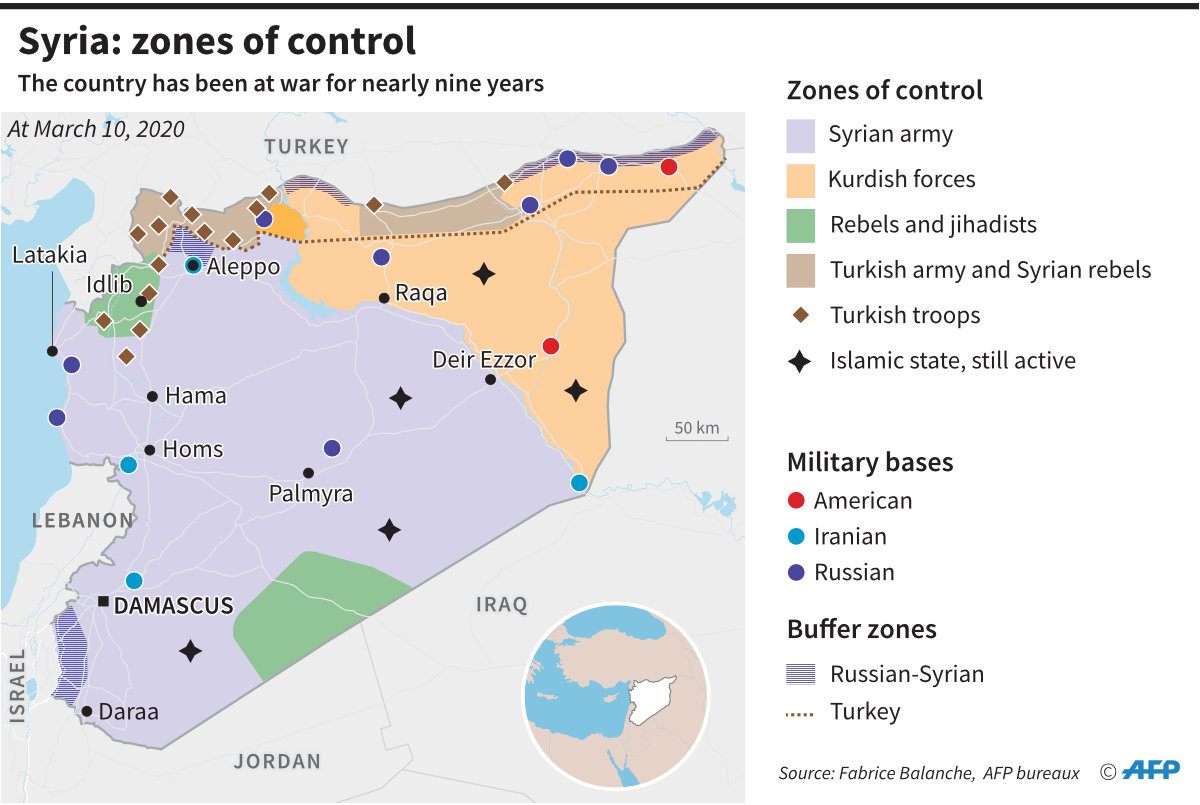
A map of Syria shows areas controlled by different groups in late 2020. Some cities controlled by the Kurdish-led Syrian Democratic Forces were retaken by Turkish forces. (AFP/File)
“People fear that reconciliation could be the beginning of punishment for Syrian Kurds for their political choices,” Omar said.
The invasion of Syria from 2016 to 2019 saw Turkiye take control of several cities, many of which were previously under AANES control.
Turkey's rationale for its invasion and continued presence in Syria in 2018 and 2019 was to create a “safe zone” between Turkey and the AANES, or Syrian Democratic Forces, armed forces.

Members of the Syrian Kurdish Asai security force stand vigil over mourners during a funeral procession for two Kurdish women killed in a Turkish drone strike in the northeastern Syrian town of Hasakah on June 21, 2023. (AFP)
Turkiye sees the SDF as the Syrian wing of the Kurdistan Workers' Party, or PKK, a group that has been at odds with the Turkish government since the 1980s.
“Of course, the Syrian Kurds know that they will be part of any deal that Erdogan wants to conclude with Assad,” Darwish said. “This issue worries the Syrian Kurds because they see the Turks as ready to do anything to harm them and their experience of autonomy.”
Darwish said the Syrian Kurds would accept reconciliation on three conditions: First, they wanted Turkey to withdraw its troops from Afrin and Ras al-Ain; Second, Turkey stopped its offensive against the Anez area; and Third, the Assad government guaranteed that the Syrian Kurds would enjoy national, cultural and administrative rights.
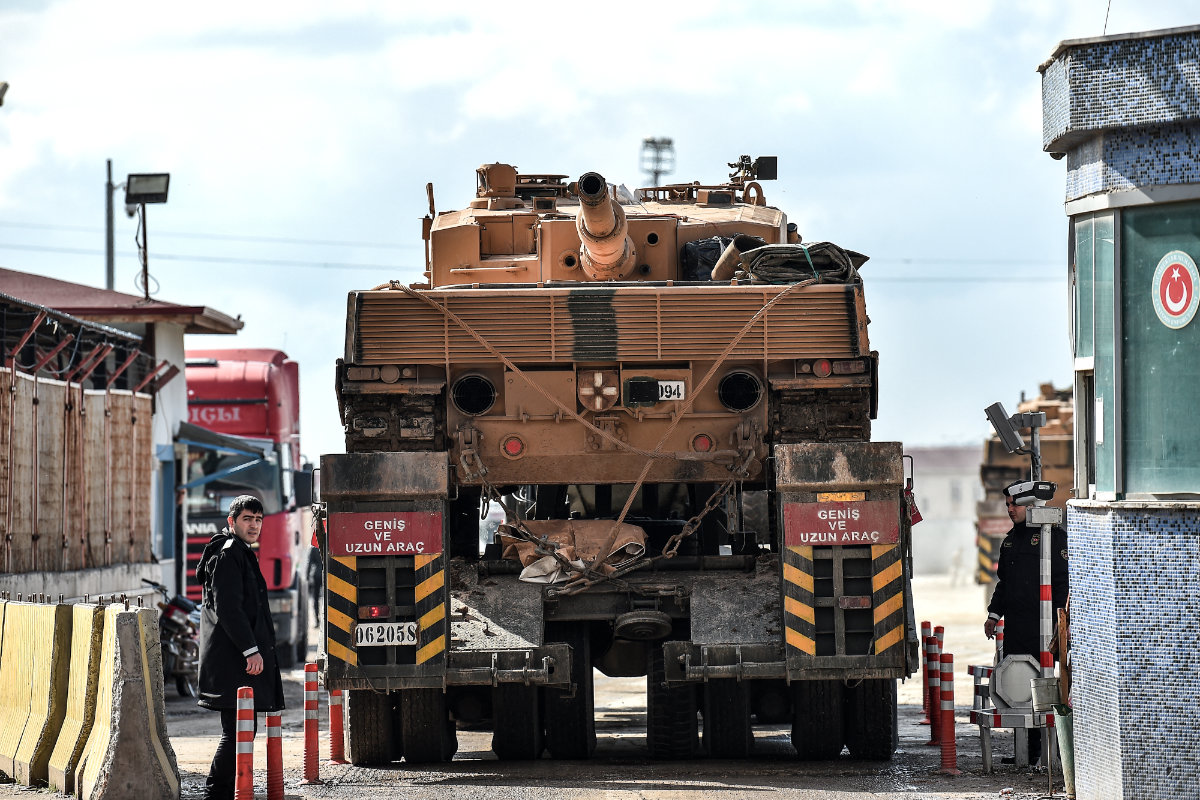
In this photo taken on January 27, 2018, a Turkish military convoy moves through the Oncupinar border crossing as troops enter Syria during a military operation in the Kurdish-held autonomous region of Afrin. (AFP/File)
But how unlikely is it that Ankara and Damascus will reconcile? “I think the chances of Erdogan and Assad resolving tensions are very slim,” conflict analyst and UNHRC representative Thoreau Redcrow told Arab News.
“Historically, Turkey’s idea of ‘normalization of Syria’ has been a one-way policy of influence for Ankara’s benefit. In this deal, Turkey continues to occupy Hatay (Liva Iskenderun), which it seized from Syria in 1938, and demands a military invasion to seize its sovereignty, similar to the 1998 Adana agreement, but does not provide anything in return.”
Assad has made it clear in public statements that a meeting between him and Erdogan would only take place if Turkey withdraws from Syrian territory. Redcrow believes that Turkey has no intention of withdrawing.
“I don’t see how Damascus is interested in being used for photo ops,” he said. “The Syrian government is more proud than other regional powers to be one of Turkey’s ‘neo-Ottoman vilayets’.”
Erdogan may be trying to capitalise on the normalisation trend in Arab countries, which began in earnest when Syria was re-entered into the Arab League last year. However, Europe and the United States remain divided.
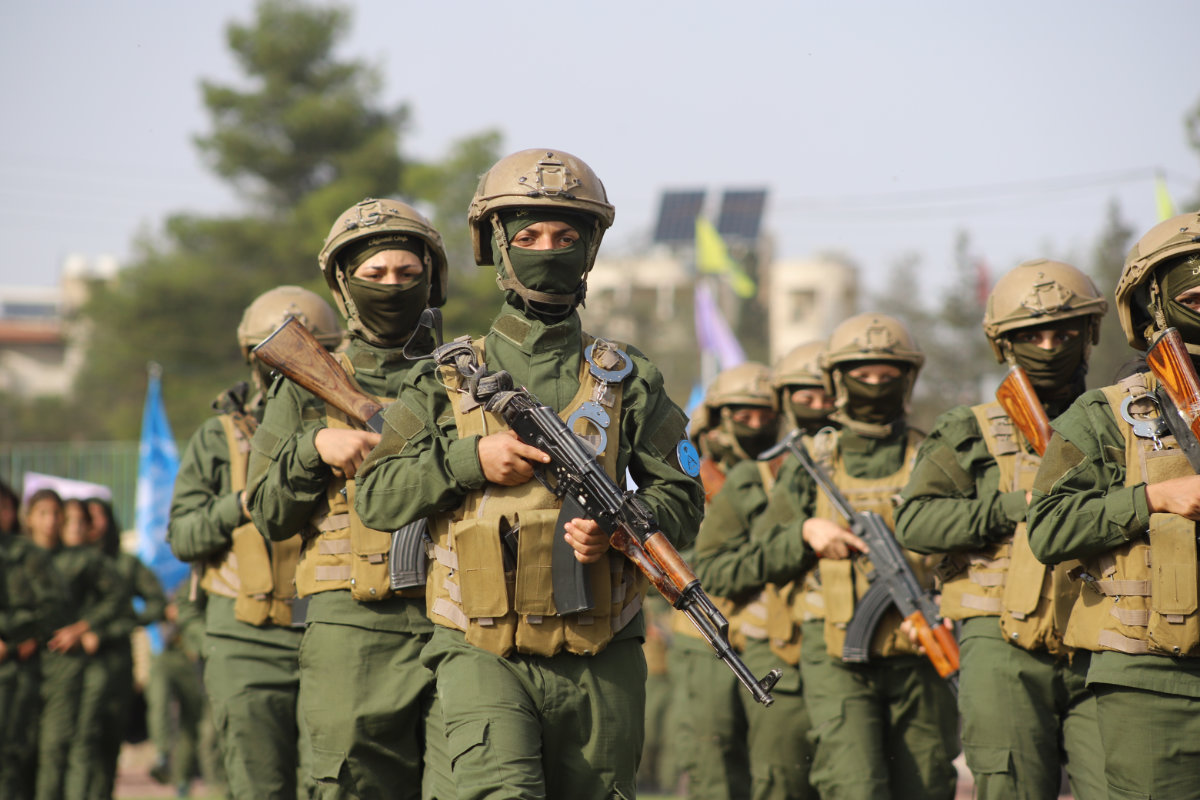
Syrian female soldiers march in opposition-held territory in northern Syria. (Photo by Ali Ali)
“In particular, Germany, France, Italy and the UK are concerned with how Turkey can control the gateway to Europe and act as a ‘continental guard’ for refugees from the Middle East and West Asia. The US is concerned with denying Russia and Iranian access to all of Syria again for strategic reasons, such as access to the Mediterranean Sea and a ‘Shia land bridge’ from Tehran to Beirut,” Redcrow said.
“The current status is more beneficial to Washington than any reconciliation, as it would put northeastern Syria at risk, where the US military is linked to the most reliable military ally against ISIS in the SDF. Therefore, Turkiye will not get any green light to risk American interests.”
The US House of Representatives passed the Assad Regime Normalization Act of 2023 in February, which prohibits Assad's normalization. In a post on social media platform X on July 12, the bill's author, Joe Wilson, expressed disappointment in Erdogan's calls for normalization, comparing it to “normalization with death.”
Although the chances of successful reconciliation are slim at this point, the estimated 3.18 million Syrian refugees living in Turkey are fearful and terrified by rumors of a return to normalcy.
“People are very scared,” Amal Hayat, a Syrian mother of five living in southeastern Turkey, told Arab News. “Since the rumors (of reconciliation) started, many people have refused to leave their homes. Even though they have been attacked by their bosses at work, they still dare not speak out for fear of deportation.”
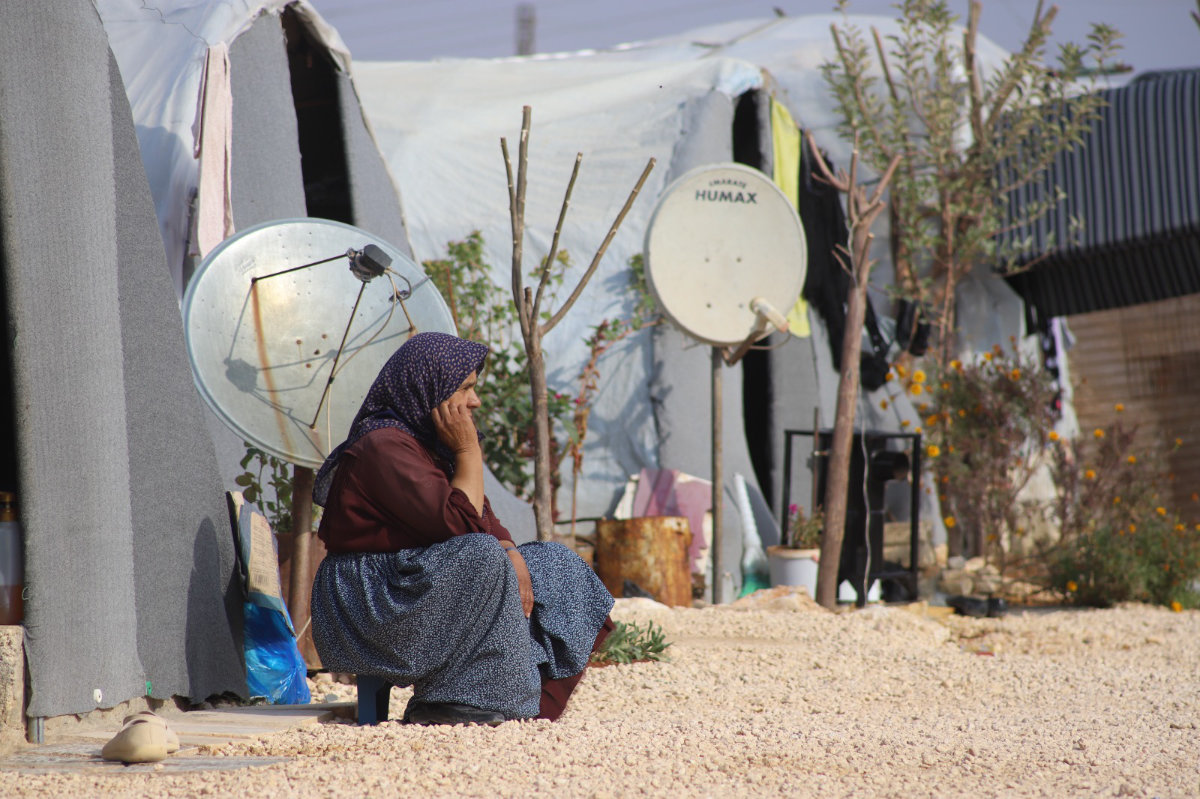
Photo of a Syrian woman in a refugee camp near the Syrian-Turkish border. (Photo by Ali Ali)
Turkey deported more than 57,000 Syrians in 2023, Human Rights Watch reports
“A forced return would have a huge impact on us,” Hayat said. “For example, if a woman goes back to Syria with her family, her husband could be arrested by the government. Or if a man is deported back to Syria, and his wife and children remain in Turkey, how will they cope? It’s difficult. Here, our children can go to school, they have security and safety.”
Fears of deportation have been exacerbated by violence against Syrian refugees that has spread across southern Turkey in recent weeks. On June 30, residents of a town in Turkey's central Kayseri province attacked Syrians and their property.
Anti-Syrian sentiment in Turkey stems from economic issues, with Turkish people viewing Syrians being underpaid or not paid at all as a threat to their employment opportunities.
“The Turkish people are very happy that we are back home,” Hayat said. “For them, it’s not fast enough. We are all living under increased stress. We just pray that (Assad and Erdogan) don’t get along.”

